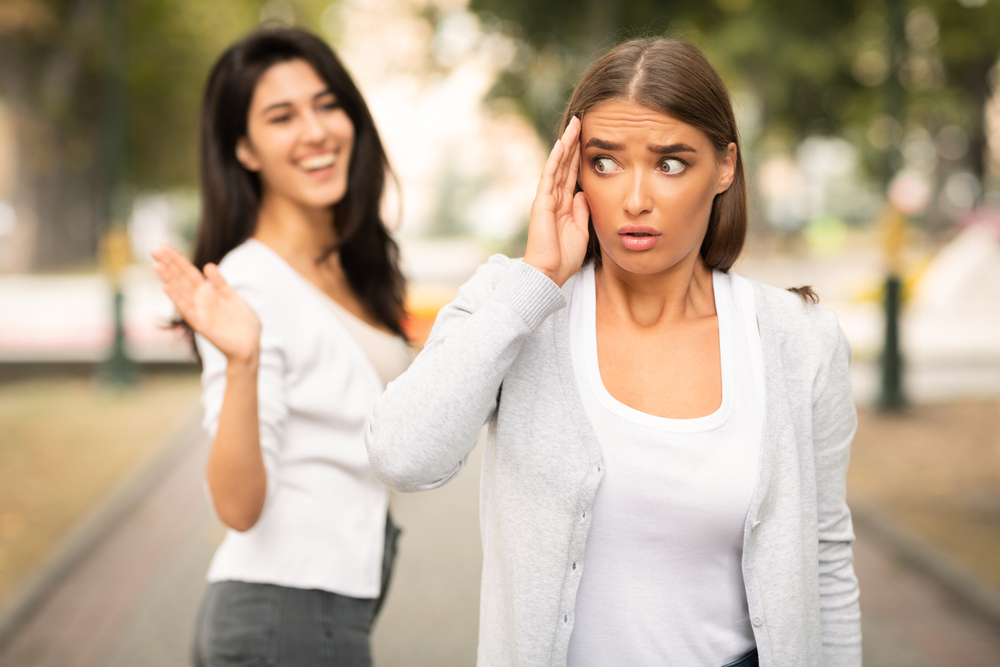Friendships should lift us up, provide support, and bring joy. But sometimes, we find ourselves in situationships that drain our energy, create anxiety, or simply feel off. It’s important to recognize the red flags that indicate a friendship may be unhealthy or even toxic — here are a few to keep your eyes peeled for.
1. Your friend constantly puts you down.

A healthy friendship should involve mutual respect and support. If your friend often criticizes you, belittles your accomplishments, or makes you feel bad about yourself, it’s a major red flag. Even if disguised as “jokes” or “constructive criticism,” these comments can erode your self-esteem and create a toxic dynamic.
2. They are always the victim.

Everyone goes through tough times, but if your friend perpetually paints themselves as the victim in every situation, it might be a sign of a deeper issue. This constant need for sympathy can be draining and emotionally manipulative. Healthy friendships involve a balance of support, not a one-sided pity party.
3. They disregard your boundaries.

Whether it’s physical, emotional, or even digital boundaries, a good friend will respect your limits. If your friend consistently pushes your boundaries, ignores your requests, or makes you feel uncomfortable, it’s a sign they don’t value your needs or autonomy.
4. You feel drained after spending time with them.

While all friendships have ups and downs, you should generally feel energized and uplifted after spending time with your friends. If you consistently feel exhausted, stressed, or emotionally drained after hanging out with a certain friend, it’s a red flag that the relationship might be toxic.
5. They’re overly competitive with you.

Friendly competition can be fun, but if your friend seems overly invested in outdoing you in every aspect of life, it’s a sign of an unhealthy dynamic. A true friend will celebrate your successes and support your goals, not constantly try to one-up you.
6. They gossip about others behind their backs.

If your friend frequently gossips about others, it’s a sign they might be doing the same about you when you’re not around. Gossip is a toxic behavior that breeds mistrust and negativity, Business Insider notes. A trustworthy friend will speak kindly of others and avoid spreading rumors.
7. They make you feel guilty for having other friends.

A healthy friendship allows for other relationships and interests. If your friend gets jealous or upset when you spend time with other people, it’s a sign of possessiveness and insecurity. A true friend will be happy for you when you make new connections and expand your social circle.
8. They take more than they give.

Friendship is a two-way street. It’s about mutual support, shared experiences, and reciprocated kindness. If your friend constantly takes from you without giving back, it’s a sign of an imbalance in the relationship. A good friend will be there for you just as much as you’re there for them.
9. They try to isolate you from other friends and family.

A controlling friend might try to subtly (or not so subtly) isolate you from other important people in your life. They might make negative comments about your loved ones, discourage you from spending time with them, or even try to create drama between you and them. This is a major red flag that signals a desire for control and manipulation.
10. They are unreliable and inconsistent.

Reliability is a cornerstone of any healthy relationship. If your friend consistently cancels plans, forgets important dates, or doesn’t follow through on their promises, it’s a sign they don’t prioritize your friendship. It’s one thing to occasionally flake out, but a pattern of unreliability can be disrespectful and frustrating.
11. They don’t respect your time or energy.

A good friend will understand that you have other commitments and responsibilities. They won’t demand your time and attention at every waking moment, nor will they guilt-trip you for prioritizing other aspects of your life. If your friend consistently disregards your time, it’s a sign they don’t value your needs or boundaries.
12. They’re always trying to change you.

A true friend will accept you for who you are, flaws and all. They won’t try to mold you into their ideal version of a friend or pressure you to change your values, beliefs, or interests. If your friend constantly criticizes your choices or tries to “fix” you, it’s a sign they don’t appreciate your individuality.
13. They refuse to take responsibility for their actions.

Everyone makes mistakes, but a mature friend will own up to their errors, apologize sincerely, and try to make amends. If your friend always blames others, deflects responsibility, or makes excuses for their bad behavior, it’s a sign they lack accountability and respect for others.
14. They don’t celebrate your successes.

A true friend will be genuinely happy for your achievements, big or small. They’ll offer support, encouragement, and celebrate your wins alongside you. If your friend seems indifferent, dismissive, or even envious of your successes, it’s a sign of a competitive and unhealthy dynamic.
15. They’re constantly negative and pessimistic.

While everyone has bad days, a friend who is perpetually negative can drain your energy and bring you down. If your friend consistently complains, criticizes, or sees the worst in every situation, it can be emotionally taxing and create a toxic atmosphere. A healthy friendship involves a balance of positivity and support, not a constant barrage of negativity.
16. They violate your trust.

Trust is the foundation of any strong friendship. If your friend betrays your confidence, shares your secrets, or lies to you, it can be deeply hurtful and damaging to the relationship. A trustworthy friend will keep your confidences and be honest with you, even when it’s difficult.
17. You have a gut feeling that something’s not right.

Sometimes, the biggest red flag is simply a nagging feeling in your gut that something is off, Psychology Today notes. If you feel uncomfortable, anxious, or unhappy around a certain friend, trust your instincts. It’s okay to distance yourself from relationships that don’t serve you, even if it’s difficult.



